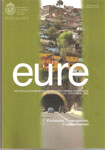Buenos Aires: fragmentation in the interstices of an unequal society
DOI:
https://doi.org/10.4067/S0250-71612008000300004Keywords:
urban fragmentation, segregation, metropolitan areasAbstract
In Latin America, the term "fragmentation" has been the subject of several significant academic debates. Used in all fields of urban research on Latin-American cities (political, economic, and spatial analysis), its diffusion resulted in its adoption as the foundational principle of a new urban model, the fragmented city. Based on empirical research on Ciudad Evita, we argue that fragmentation is a phenomenon that can also be observed in the interstices of an unequal society in the form of actors ' micro-strategies of social distinction and negotiation in the context of social polarization and contradictory and intermittent urban policies.
Downloads
Published
How to Cite
Issue
Section
License
Copyright (c) 2008 Revista EURE - Revista de Estudios Urbano Regionales

This work is licensed under a Creative Commons Attribution 4.0 International License.
Al momento de aceptar la publicación de sus artículos, los autores deberán formalizar la cesión de derechos de autor a EURE, según las condiciones establecidas por la Revista.
Ésta establece que el autor autoriza a EURE de manera gratuita, exclusiva e ilimitada a reproducir, editar, publicar, distribuir, publicitar, comercializar y traducir el artículo, a cualquier soporte conocido o por conocer y desarrollar.
Del mismo modo, los autores aseguran que el artículo propuesto es original, no publicado y no propuesto para tal fin a otro medio de difusión.


